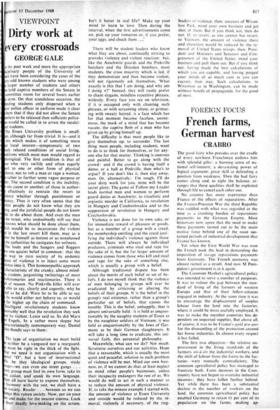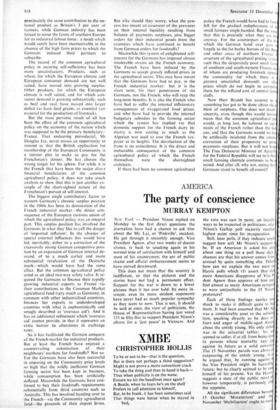FOREIGN FOCUS
French farms, German harvest
CRABRO
The good fairy who presides over the cradle of every newborn Frenchman endows him with splendid gifts: a burning sense of na- tional self-interest; a devastating power of logical argument; great skill at defending a position from weakness. Then the bad fairy comes along and, to right the balance, ar- ranges that these qualities shall be exploited through life to cancel each other out.
No country has more experience than France of the effects of reparations. After the Franco-Prussian War the third Republic was saddled with what was regarded at the time as a crushing burden of reparations payments to the German Empire. Most historians now agree that the need to make these payments turned out to be the main motive force behind one of the most sus- tained periods of industrial development that France has known.
Yet when the First World War was won the French took the lead in demanding the imposition of savage reparations payments from Germany. The French economy was almost ruined as a result. And now M Pom- pidou's government is at it again.
The Common Market's agricultural policy was intended to serve a number of purposes. It was to reduce the gap between the stan- dard of living of the farmers of western Europe and that of their fellow-citizens engaged in industry. At the same time it was to encourage the displacement of surplus labour from the land into the factories, where it could be more usefully employed. It was to make the member countries less de- pendent on imported supplies. But above all. of course, it was to be France's quid pro quo for the dismantling of the protection around her home industries. In almost every respect it has failed.
The first two objectives—the relative im- provement in the living standards of the farmers vis-à-vis the industrial workers, and the shift of labour from the farmsio the fac- tories—were mutually contradictory. The common agricultural policy has managed to frustrate both. Farm incomes in the Com- munity have not begun to overtake industrial incomes: they have fallen further behind.
Yet while there has been a substantial decline in the number of workers on the
land. the common agricultural policy has enabled Germany to retain I I per cent of its population on the farms, making ap- proximately the same contribution to the na- tional product as Britain's 3 per cent of farmers, while .German industry has been forced to scour the farms of southern Europe for its industrial labour force : a result which would surely have been inconceivable in the absence of the high farm prices to which the Germans induced their partners to subscribe.
The record of the common agricultural policy in securing self-sufficiency has been more unsatisfactory. Products, such as wheat, for which the European climate and European consumer demand are not well suited, have moved into growing surplus. Other products, for which the European climate is well suited, and for which con- sumer demand is growing substantially, such as beef and veal, have moved into larger deficit (as have feed grains, as essential raw material for the production of livestock).
But the most perverse result of all has been the effect of the common agricultural policy on the economy of the nation which was supposed to be the primary beneficiary : France. That endearing pterodactyl, Mr Douglas Jay, never misses an opportunity to remind us that the British application for membership of the European Community is a sinister plot to make us pay for the Frenchman's dinner. He has chosen the wrong target for his spleen. For while it is the French that have been the major direct financial beneficiaries of the common agricultural policy, it does not take much analysis to show that this is just another ex- ample of the short-sighted nature of the Frenchman's pursuit of self-interest.
The biggest single contributory factor to western Germany's chronic surplus position in the 1960s has been its domination of the French industrial market—the direct con- sequence of the European customs union of which the agricultural policy was an integral part. This surplus position has involved the Germans in what they like to call the danger of 'imported inflation'. In the absence of special external influences this would have led, inevitably, either to a correction of the excessively strong German competitive posi- tion by an expansion of German internal de- mand, or to a much earlier and more substantial revaluation of the Deutsche mark—which would have had the same effect. But the common agricultural policy acted as an ideal two-way safety valve. It re- quired the Germans to finance their rapidly growing industrial exports to France via their contributions to the Common Market agricultural fund (very much as Germany, in common with other industrialised countries, finances her exports to underdeveloped countries with what is euphemistically and smugly described as 'overseas aid'). And it has an additional refinement which 'overseas aid' cannot provide, in that it represents an extra barrier to alterations in exchange rates.
So it has facilitated the German conquest of the French market for industrial products. But at least the French have enjoyed a countervailing colonisation of their neighbours' markets for foodstuffs? Not so. For the Germans have also been successful in imposing on the Community price levels so high that the wildly inefficient German farming sector has been kept in business, while consumption has been artificially deflated. Meanwhile the Germans have con- tinued to buy their foodstuffs requirements substantially from third countries such as Australia. This has involved handing over to the French—via the Community agricultural fund—the proceeds of their import levies.
But why should they' worry, when the pro- cess- has meant an easement of the pressures on their internal liquidity resulting from balance of payments surpluses, plus bigger orders for their industrial goods from the countries which have continued to benefit from German orders for foodstuffs?
Meanwhile this system of enlightened self- interest for the Germans has imposed almost intolerable strains on the French economy. The French have been induced by the Germans to accept grossly inflated prices in the agricultural sector. This may have meant that the Germans have had to pay, in the French industrial market: but it is the short term, fOr their penetration of the Germans, not the French, who will reap the long-term benefits. It is also the French who have had to suffer the internal inflationary consequences of exaggerated food prices, and who have had to provide the internal budgetary subsidies to the farming sector which the system has implied (so that domestic support for the French dairy in- dustry is now costing as much as the Algerian war used to cost the French tax- payer at its height). The devaluation of the franc is no coincidence. It is the direct and ineluctable consequence of the common agricultural policy of which the French themselves were the shortsighted architects.
If there had been no common agricultural
policy the French.would have had to foot bill for the gradual redeployment of small farmers single-handed. But the iron that this 'is precisely what they are do anyway. For the .counterpart of the les which the. German hand over goes 1, largely to the fat barley barons of the Bea and other areas of northern France. structure of the agricultural pricing syste such that the desperitely poor small far of southern and south-western France, m of whom are producing livestock (pm; the commodity for which there is greatest unsatisfied demand) are ofie prices which do not begin to compen them for the inflated cost of animal feedi stuffs.
Now Herr Brandt has assured us something has got to be done about the p blem of surpluses. One does not doubt sincerity, even. though this would inevita mean that the common agricultural po would, at long last, be tailored to suit needs of the French rather than the Ge ans, and that the Germans would no Ion be artificially insulated from the autom correction of their propensity to prod payments surpluses. But it will not hap The Free Democrat Minister of Agricu for the Federal Republic will see to it that small farming clientele continues to be tected. And after all, why not, seeing that Germans stand to benefit all round?















































 Previous page
Previous page